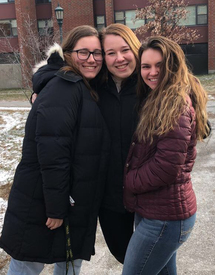 LASP students: Emily Dean, Medwyn Roberts, and a friend (from left to right)
LASP students: Emily Dean, Medwyn Roberts, and a friend (from left to right) I joined the life science sector of LASP before I had any idea about what it was, or how much of an amazing opportunity it would become. All I knew was that I would be taking extra classes about my major and living with people who had the same interests as me. However, when I arrived at school, I realized that it was not only both of those things but also an amazing community full of people who understood what I wanted to do and who could support me through it.
Being a life science major is a lot of work, it includes many late nights of studying and weekends with seven-hour study sessions. I was fortunate enough to not have to do these alone. By being in LSS, I lived with people who were taking a majority of my classes and that meant that whenever I had a question all I had to do was go next door and ask. It also means that you have a support system of people who understand when you complain about how the redox reactions don’t make sense, or that the chapter 7 quiz was too hard. LSS gives you people to laugh with, and cry with, but most importantly, people to walk to chem tests with.
With this program there are two class that you take. The first one is called Nobel Prize Winners. Each class you will discuss a different Nobel prize and the science behind it. Learning about these Nobel prizes game me so much respect for all of the scientists that made tremendous progress into what we know about our world and ourselves. That class taught me how to write more scientifically and to think scientifically. The next class we took was the CURE lab. CURE stands for course-based undergraduate research experience. This class gives you a chance to do independent (or group) research in a safe setting, knowing that you had support and help if you needed it. In this classes I researched toadfish mating calls that were recorded from off the coast of panama. Before this class I had never heard of a toadfish, let alone known what its mating call sounds like. But now I absolutely love to tell people about toadfish “boops”. We used the soundscape program raven to analyze the soundscapes and count the boops. Learning about soundscapes is never something I thought I would be able to do, but now that I have, I wouldn’t have traded it for the world.
If you have the chance to be a part of LSS, do it. It is not only academically, but socially (and you live in the best housing on campus). It will enhance your freshman year at UVM and prepare you for the next three years and whatever comes next.
Being a life science major is a lot of work, it includes many late nights of studying and weekends with seven-hour study sessions. I was fortunate enough to not have to do these alone. By being in LSS, I lived with people who were taking a majority of my classes and that meant that whenever I had a question all I had to do was go next door and ask. It also means that you have a support system of people who understand when you complain about how the redox reactions don’t make sense, or that the chapter 7 quiz was too hard. LSS gives you people to laugh with, and cry with, but most importantly, people to walk to chem tests with.
With this program there are two class that you take. The first one is called Nobel Prize Winners. Each class you will discuss a different Nobel prize and the science behind it. Learning about these Nobel prizes game me so much respect for all of the scientists that made tremendous progress into what we know about our world and ourselves. That class taught me how to write more scientifically and to think scientifically. The next class we took was the CURE lab. CURE stands for course-based undergraduate research experience. This class gives you a chance to do independent (or group) research in a safe setting, knowing that you had support and help if you needed it. In this classes I researched toadfish mating calls that were recorded from off the coast of panama. Before this class I had never heard of a toadfish, let alone known what its mating call sounds like. But now I absolutely love to tell people about toadfish “boops”. We used the soundscape program raven to analyze the soundscapes and count the boops. Learning about soundscapes is never something I thought I would be able to do, but now that I have, I wouldn’t have traded it for the world.
If you have the chance to be a part of LSS, do it. It is not only academically, but socially (and you live in the best housing on campus). It will enhance your freshman year at UVM and prepare you for the next three years and whatever comes next.
 RSS Feed
RSS Feed
